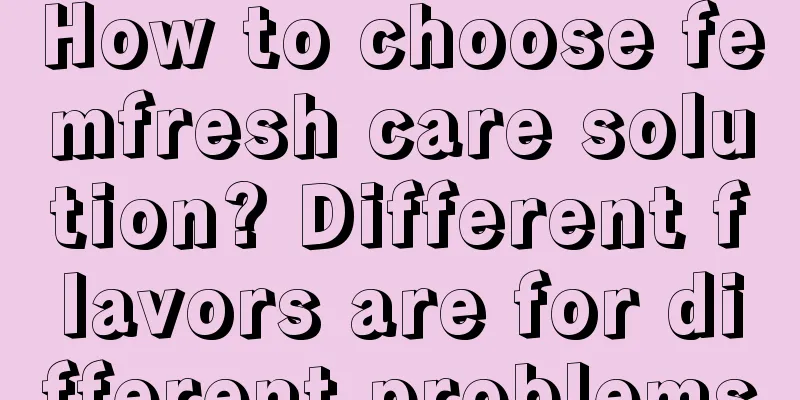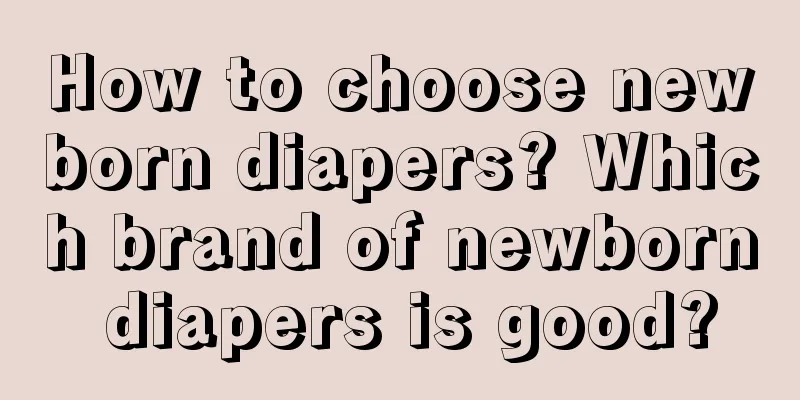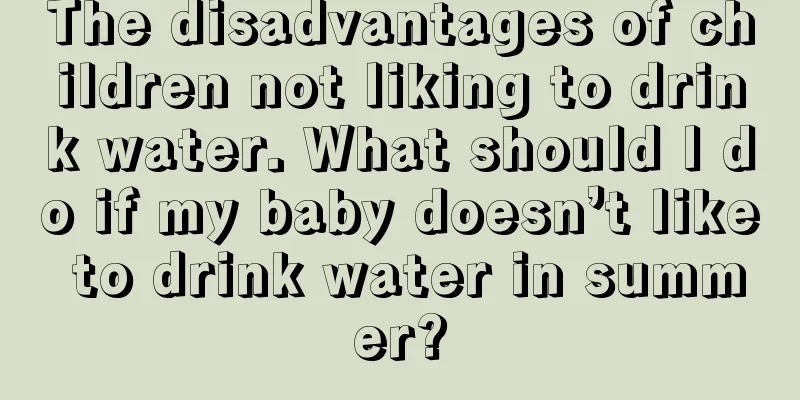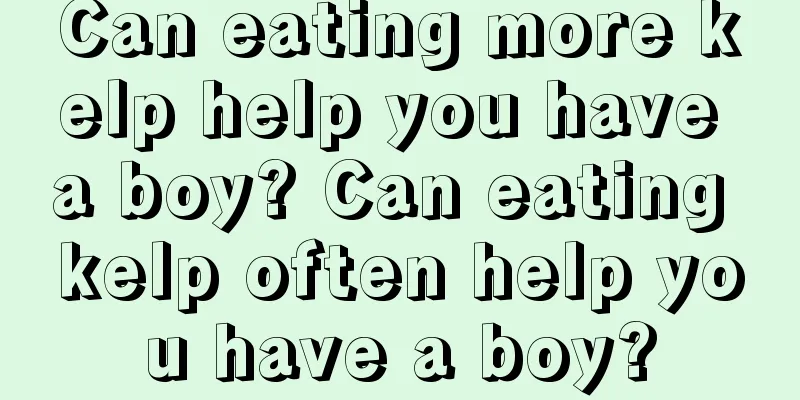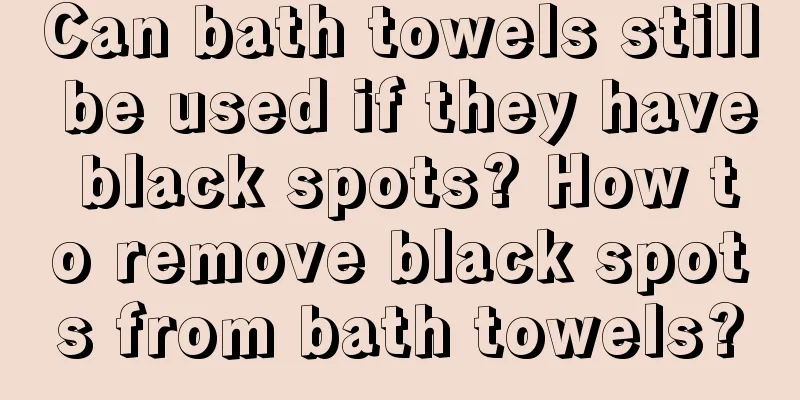How many months is it appropriate to use a pacifier? What are the advantages and disadvantages of using a pacifier for babies?

|
Pacifiers are very common baby products. Pacifiers are an object that can replace the nipple. Many parents use pacifiers to comfort their babies and prevent them from crying. How many months is it appropriate to use a pacifier?It is most appropriate to use a pacifier when the baby is about ten months old, because it can prevent the baby from becoming attached to breast milk during the weaning period, which would cause weaning difficulties. A pacifier can soothe the baby's emotions very well, but it is not recommended for the baby to use a pacifier for a long time, as it will cause the baby to have buck teeth. You need to pay attention to the child's personal hygiene at ordinary times, and the pacifier should also be disinfected regularly. The pros and cons of using a pacifier for your babyBenefits of using a pacifier: 1. Increase the baby's sense of security and help the baby to form a regular sleep: The baby's complex with pacifiers can be traced back to the fetal period in the womb. The fetus will often suck its fingers in the mother's belly. Therefore, the baby can increase its sense of security by sucking continuously. Babies, especially newborns, like to cry and make noise, especially at night. Many babies cry and make noise at night and sleep during the day. Pacifiers can comfort babies better and help them form a regular sleep. 2. It is conducive to breastfeeding: Some mothers worry that their babies will no longer like their nipples after using pacifiers. In fact, babies are much smarter than you think. They clearly know the difference between their mother's nipples and plastic products. When the baby needs to feed and comfort his mother, he will smartly choose his mother instead of the pacifier. On the contrary, after the child gets the pacifier, it is likely to promote breastfeeding. This is because the pacifier allows the baby to sleep peacefully, allowing the tired mother to take time to rest well, and can relieve the mother's anxiety and irritability caused by the baby's crying and making noise, so that the mother's breast milk is more sufficient and nutritious. 3. It can reduce the incidence of sudden infant death syndrome: Through investigation, some experts found that the probability of sudden infant death in children who use pacifiers when sleeping is 3 times lower than that of children who do not use pacifiers. The main reason is that when babies fall asleep with pacifiers in their mouths, they generally do not sleep on their stomachs, which reduces the possibility of suffocation. In addition, babies who use pacifiers are more sensitive when sleeping and will wake up actively if they feel uncomfortable. These characteristics can prevent babies from sudden death. Disadvantages of using a pacifier: 1. Increase the incidence of oral infections and otitis media: When babies use pacifiers, the pacifiers often fall on the bed or even the ground and become contaminated. In addition, the baby's immunity is very low, viruses and bacteria will attack the baby through the pacifier, causing stomatitis, otitis media, and even infections of other organs in the body. 2. Long-term use may cause uneven teeth: If your child only occasionally uses a pacifier before the age of one, it will generally not affect the development of his teeth. But if your child is an "addict" to pacifiers, you should be careful about his teeth. Especially if the pacifier used by the baby is of unqualified quality, it is more likely to cause the baby's teeth to grow unevenly. 3. Some babies may be addicted to pacifiers: pacifiers have similar shapes and tastes to mothers' nipples, and some mothers always like to use pacifiers to comfort their babies no matter what causes their babies to cry, which may cause babies to form a conditioned reflex to the pacifier and become dependent on it. In general, the benefits of using pacifiers for babies should outweigh the disadvantages, but you must choose one that meets national safety inspection standards; soft to the touch, moderate hardness; bite-resistant, not easy to break; high temperature resistant, not easy to deform; shaped like a nipple, and different sizes and lengths of pacifiers for babies of different ages. 4. Because children suck on pacifiers in different ways, the salivary glands secrete continuously, causing a lot of digestive enzymes in the mouth to be lost, which is very harmful to the child's physical development. In particular, excessive loss of digestive enzymes is not conducive to the child's gastrointestinal digestion and absorption. 5. The baby will take in too much gas due to constant sucking on the pacifier, which can easily cause abdominal distension and even intestinal cramps. Inhaling too much air can also cause the baby to burp constantly, causing the baby to spill the inhaled milk, which will have a negative impact on the child's body. 6. If the child repeatedly sucks on the pacifier and it is not cleaned in time or thoroughly, it can easily cause contamination of the nipple. Because the child's immunity is not yet fully developed, it can easily cause some infectious diseases, especially if the bacteria on the pacifier are not sterilized at high temperature before use, some bad bacteria and viruses will be brought into the body. 7. Because children constantly suck on pacifiers, it is easy to cause the upper and lower jaws to protrude outward, and the teeth to protrude outward, which is not only not conducive to the child's future bite, but also affects the beauty of the child's face. The impact on the child's future life is very considerable. Keep the following in mind when using a pacifier1. Clean the pacifier with baby detergent every day. If it touches dirt or falls on the ground, clean it immediately. 2. Do not tie a string on the pacifier, because a string that is too long may affect the child's activities and may also wrap around the child's neck or arms. 3. Replace the pacifier for your child in time. Old or damaged pacifiers should be replaced in time. 4. If the child always bites the pacifier, it indicates that the baby is about to grow teeth. You should prepare teething toys for him. Prevent the child from biting off the pacifier and swallowing it, otherwise there is a risk of suffocation. 5. Try to find out why your baby is crying, and don't let the pacifier become the only tool to deal with your baby's crying. 6. Try not to use pacifiers after your child is one year old. You can choose other comfort items for your child. The maximum age for using pacifiers is 2 years old. How to wean yourself off a pacifierTo get rid of the pacifier, you should first gradually reduce its use. You can set a time and scope for its use, so that the baby can gradually get used to it and can only suck it a few times a day. Cut off the pacifier, tell the baby that it is broken, and throw it away. If the baby must hold the pacifier in her mouth before going to sleep, you can let her sleep with the pacifier in her mouth first, gently take it away after she falls asleep, and quietly put it beside her bed before she wakes up. |
<<: Why do children often cough? What should I do if my child often coughs?
>>: How to bathe your baby correctly? What is the water temperature for bathing your baby?
Recommend
Is it normal to have back pain in early pregnancy? How to relieve back pain in early pregnancy
Many expectant mothers will find a lot of inconve...
What should I check before getting pregnant? What should I do to prepare for pregnancy?
Mothers who are ready to have a baby must go to t...
At what age should children start to stop wearing diapers? How to stop wearing diapers for good children?
"Weaning from diapers" is a necessary d...
What foods are easy for babies to digest? What are some easy-to-digest baby foods?
What foods are easy for babies to digest? What ar...
How is the breathability of Kao diapers? Is Kao diapers suitable for boys or girls?
When choosing diapers for babies, breathability i...
Benefits of breastfeeding for babies Benefits of breastfeeding for mothers
We all know that breastfeeding has many benefits ...
What diseases can affect pregnancy and avoid the risk of infertility
Some women have been unable to conceive for a lon...
Can pregnant women take stomach medicine during pregnancy?
The health of prospective parents is very importa...
How to name a baby born on New Year's Eve? A complete list of baby names for New Year's Eve
New Year's Eve is coming soon. As a festival ...
How to distinguish true and false labor pains, and what methods can be used to relieve them
Mothers are very worried when the due date is app...
What is the smell of aromatherapy essential oil? Is aromatherapy essential oil harmful to the body?
Aromatherapy essential oils are products that we ...
Can pregnant women eat barbecue? You can still eat barbecue occasionally during pregnancy.
Barbecue is a kind of snack food that everyone li...
How to promote your baby's intellectual development and physical coordination
If babies find sounds interesting, dance with joy...
How old is the child suitable to stop breastfeeding? How to stop breastfeeding
Unconsciously, my baby is already over one year o...
How to deal with neonatal jaundice quickly? How to deal with neonatal jaundice quickly?
Many babies will suffer from jaundice when they a...

